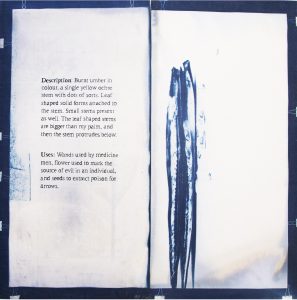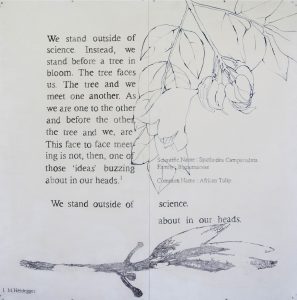Archive
n. A repository or collection of information, historical documents or records providing information about a place, institution, or group of people.
v. To place or store; to keep.
The word archive, especially as a verb in the English language, can be read as the intent of art practices spanning various media, contexts and movements. As the meaning of the word is distilled to its crux – to keep – it becomes general and yet all the more powerful.
As I initially noticed (and was often pointed out by others) the tendency to archive within my practice, each connotation of the word archive itself became points of departure. From the instantaneous visual in our minds of an old dusty filing cabinet to shelves of film rolls and photographs on one hand, to the act of putting pen to paper or the click of a camera shutter, the meaning of the word began to oscillate between noun and verb.
The degree to which culture and its relationship with colonialism and/or migration being discussed through this building bridges platform has actually really caught me off-guard. Though I do know that in one way or another, a group of 14 culturally diverse artists (assuming ofcourse that those of us from India are still acutely diverse in background) are bound to have gotten here, it’s still interesting to see that gap being bridged through shared histories.
In lieu of these discussions, I have been thinking about my project for January through a similar lens. I would love to open up my project to all the artists, asking those of them who would want, to talk to me about one aspect of their culture which they would use to draw a parallel between the natural world and myths/folklore. Extending my current practice to a space which is more about shared cultures than about knowledge, maybe the simultaneous histories that existed across such borders will be an interesting place to start.
I know I am narrowing it down to a great extent when I say mythical narratives regarding forces or aspects of nature and each artists own cultural backgrounds, but considering my current areas of research and the fact that our histories themselves are vast and often hard to pen down without complexity, I would like to see if the narrowing down might help for the first phase of such a project. Maybe some day I will be able to see it as more. 🙂
Over the past two years I have found some interesting parallels particularly between Indian, African and Greek legends, and I do think it would be an interesting way for me to get to know the cultural binaries of other artists without fixating on our present understandings of each other – instead looking at each of us as individuals who have so much more in common which we may not even be aware of about ourselves. In the little bit of time I have spent getting to know spaces and cultures that are foreign to me, the moments in which certain unexpected parallels were drawn were actually the most fascinating.
That being said, I am not sure of how this project will develop and am open to suggestions from any of you who could help me visualize it! I do think in one way or another it will be a series of narratives, but I am rather unsure of how it will pan out.
Thes logic of an archive is pushed further, acting as a canopy for various interconnected meanings and narratives – in turn breaking the system which an archive, database or museum would follow. Following a quasi-archival logic, the underscoring of such systems becomes an open-ended system of its own.
The archive – whether seen as a temperament, an impulse, a mode of control or an inherent need – holds within its cabinets and drawers’, moments from the past that have been strategically positioned; some hidden in plain sight and others neatly organized fragments, each with their own narrative.
We are confronted with relationships between archive and memory, archive and public information, archive and trauma, archive and ethnography, archive and identity, archive and time.
Looking forward to responses, and hoping to weave something together!



I am fascinated by the way you have described meaning of “Archive” and how you have given the word this magnificent power. because one thing i have learned is the importance of an archive as you have described it : Our entire history is based on archives which have been in place or set up.
I think archiving system has always been apart of our living experience. From giving names to a person to building kingdoms and the greatest monuments where built as a piece of archive so that the future generations would always have some so of evidence or remembrances as to what that time was all about.
Even with most of the wars that have happened, some one or some individuals wanted to leave a what we could call a legacy. When i look at both these words, some how i feel that they are parallel and they influence each other, certainly as to the only way we would know of a legacy is through the archive which is provided which intern because the factor in us receiving that particular information.
My other interest in on your post is the position that you are proposing: “one aspect of their culture which they would use to draw a parallel between the natural world and myths/folklore.”
This has also been a form of archiving in Africa as it stories which were used as a form to pass down the histories of people. whats amazing for me is how. Most times this the myths i heard as a young person where intertwined with the real world. people most talking about the horror of what they have seen.
Most notable one was pinky pinky. a mysterious girl that would appear on a mirror if your lone in a room or toilet. A number of artist have tried to recreate that story to a visual formate.
I have shared a link. below.
https://www.thesouthafrican.com/your-childhood-myth-tormentor-pinky-pinky-comes-to-life-in-this-conceptual-imagery-series-photos/